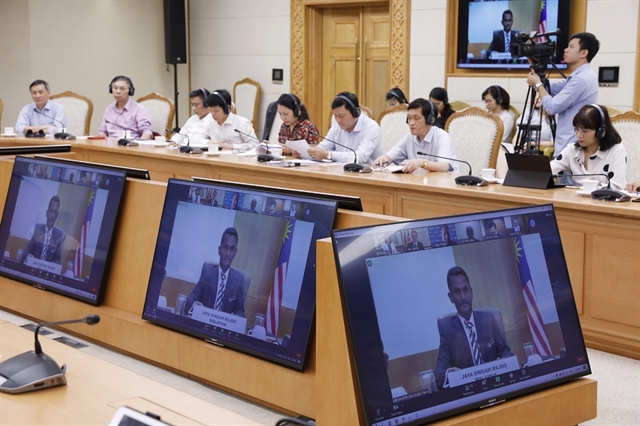 Society
Society

The COVID-19 pandemic has posed great challenges to the Government, but the Government’s proactiveness was key to helping Việt Nam devise effective solutions in the fight against the pandemic, said Nguyễn Thế Trung, a member of the E-Government Advisory Group of the Office of the Government.

|
| A Vietnamese delegation attends the sixth ASEAN-OECD Good Regulatory Practice Network (GRPN) meeting which was held virtually on Monday. VNA/VNS Photo |
HÀ NỘI — The COVID-19 pandemic has posed great challenges to the Government, but the Government’s proactiveness was key to helping Việt Nam devise effective solutions in the fight against the pandemic, said Nguyễn Thế Trung, a member of the E-Government Advisory Group of the Office of the Government.
He made the statement at the sixth ASEAN-OECD Good Regulatory Practice Network (GRPN) meeting which was held virtually on Monday.
Although not much knowledge of COVID-19 was available at the time, the Vietnamese Government proactively responded to even the first case, Trung said.
The Government has placed a priority on dissemination work to raise the awareness of the whole society so people can work together on disease prevention.
“The good co-ordination between the health sector and technology is an effective way for Việt Nam to cope with the COVID-19 pandemic,” Trung said.
One of the most effective methods Việt Nam took and then many countries have adopted is to enable traceability as soon as the first case of transmission occurs.
To control the pandemic, Trung said, Việt Nam has set up three pillars namely Government capacity and responsibility for anti-pandemic control, the response capacity of the health system and society's awareness and action in pandemic control.
Speaking at the meeting, Ngô Hải Phan, Director General, Administrative Procedure Control Agency under Office of the Government, said following the success of the first session, the second session would address the opportunities and challenges posing Organisation for Economic Co-operation and Development (OECD) governments and ASEAN that are increasingly utilising digital technology.
Due to the need to limit human contact and the physical transfer of information, governments have widely implemented digital technology to maintain functions. This poses opportunities and challenges. On one hand, digital technologies can improve government processes, including reducing regulatory burdens that may hinder the provision of important health, economic and social services. On the other, they pose a challenge for regulators to quickly adopt these technologies themselves, while also protecting society against unintended consequences.
At the meeting, Ambassador of the United Kingdom of Great Britain and Northern Ireland to ASEAN, Jon Lambe, shared the challenges countries are facing due to the COVID-19 pandemic.
He emphasised that Việt Nam has emerged as a bright spot for pandemic prevention and fighting.
The fact the meeting was hosted by Việt Nam was a testament to the success of the country in response to the COVID-19 pandemic, Lambe said.
Hairil Yahri Yaacob, Deputy Secretary-General, Ministry of International Trade and Industry of Malaysia, said the meeting was a good opportunity for OECD and ASEAN countries to connect and share experiences in response to the COVID-19 pandemic on a global scale and post-pandemic recovery.
In the current context, technology would help reduce the burden on the parties as well as the process of issuing regulations and applications of these regulations in the future, he said.
According to Yaacob, the Malaysian government has called on regulators and the private sector to address the burden and bottlenecks in term of procedures for sectors, especially those affected by COVID-19, so they can overcome difficulties.
He cited initiatives like the building of a portal for centralised consultation, quick removal of procedures and regulations that are bottlenecks and Establishment of a council chaired by the prime minister to address the concerns of businesses.
Participants at the meeting also discussed good experience to aid post-COVID-19 recovery including digitising enforcement regulations (electronic inspection, electronic certification), principles of effective policymaking in the fourth industrial revolution and upgrading the regulatory management system. — VNS